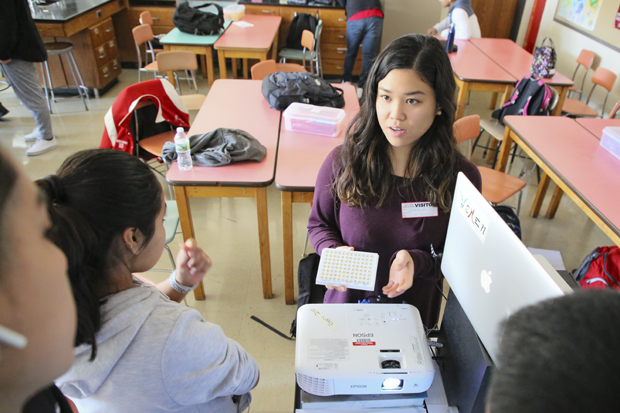Brandeis scientists reveal the secret behind fruit flies at Waltham High School
 Photo/Mike Lovett
Photo/Mike LovettBrandeis PhD student Jasmine Le discusses fruit fly experimentation with students at Waltham High School
Brandeis biologists are on the case to inspire the next generation of scientists.
On Feb. 14, undergraduate and graduate researchers from Nobel laureate Michael Rosbash’s lab showed students at Waltham High School how using 3D printing and lasers to experiment on fruit fly brains can help us learn more about sleep.
The class was a small snapshot into the work that won Rosbash, Emeritus Professor Jeffrey Hall and Rockefeller University’s Michael Young the Nobel Prize in Physiology or Medicine in 2017 for their research into circadian rhythms.
“It’s important to share this with the community and I think at this age, high school students in particular are still very impressionable,” said Brandeis PhD student Jasmine Le. “I love to share what excites me about science.”
“I think a lot of people don’t really know what happens in a lab or what it means to be a scientist,” she added. “Maybe they imagine Albert Einstein when they first think of science, but it’s way more real than that. What we do in the lab is very accessible. We’re using materials that are very accessible to do our experiments.”
Albert Yu, a third-year PhD student, and Farzana Parveen ’19 joined Le in the classroom to share their research experience. Yu demonstrated how Rosbash lab staff uses 3D printers to create some of the tools they use to study fruit flies.
Le then demonstrated an experiment Brandeis biologists conduct to put the flies to sleep; fruit fly brains, the researchers pointed out, have similarities to human brains, making fruit flies an ideal specimen for circadian rhythm research that has led to discoveries about humans.
The trio was just one of many Brandeis groups to visit Waltham High School that day. Brandeis researchers spent time with other science classes and special education students as part of the university’s effort to engage with its local community, which is overseen by Anique Olivier-Mason, the director of education, outreach and diversity for the Material Research Science and Engineering Center (MRSEC).
In addition to Le's cohort, post-docotral students Matthias Schlichting and William Lenh, as well as PhD student Tyler Hill participated in a panel in which Waltham High School students got to ask questions about science, life trajectories and career advice.
“We always need more scientists,” Yu said. “There are an infinite number of questions that need answering and are worth addressing. We need these bright, inspired minds to do it.”
Categories: General, Research, Science and Technology





